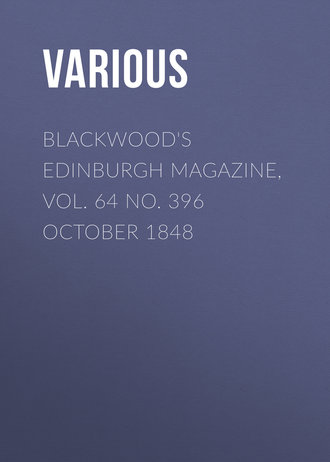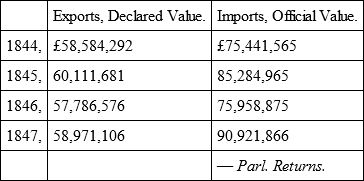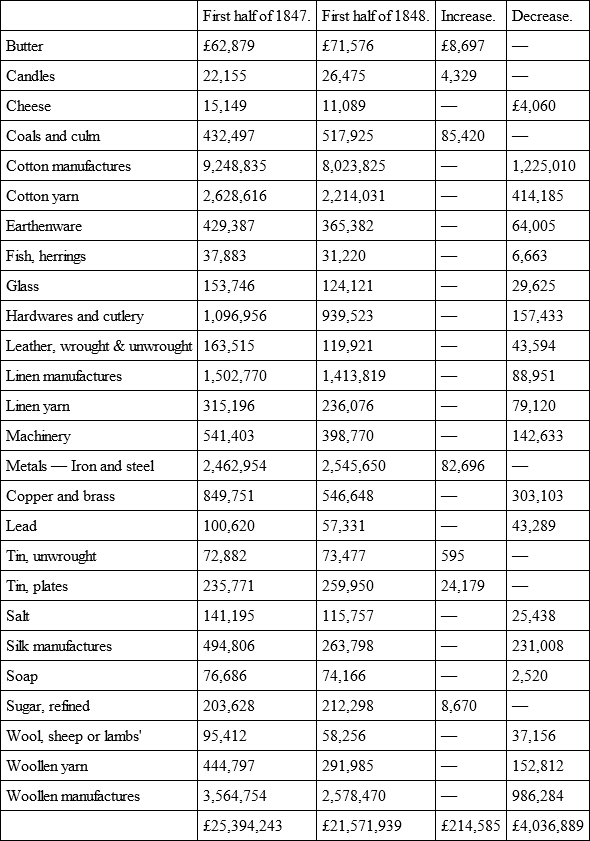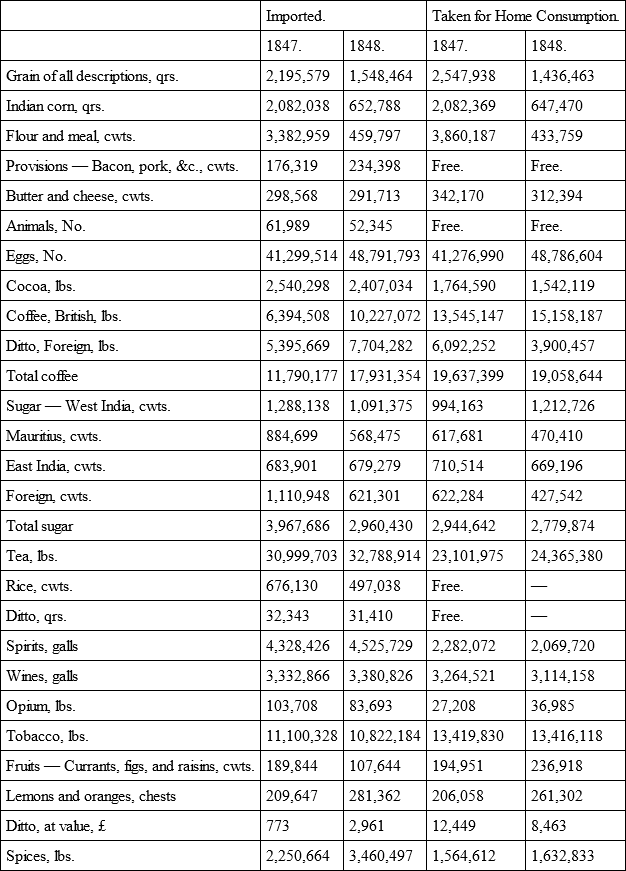 полная версия
полная версияBlackwood's Edinburgh Magazine, Vol. 64 No. 396 October 1848
"Upon the watery plain
The wrecks are all thy deed,"
includes all that is or can be said more of ship or fleet. Again, in the next stanza —
"Thou dost ariseAnd shake him from thee; the vile strength he wieldsFor earth's destruction thou dost all despise" —Here is again said all that is possible to be said. "Thou dost arise and shake him from thee" being perhaps the strongest expression obtained at all; and the "vile strength" being precisely the Armadas described immediately afterwards with so much pomp and pride. Thus there is really confusion and oscillation of thought – mixed with a progress a standing still – and this characteristic of much of Byron's poetry comes prominently out – Uncertainty. Impulses and leaps of a powerful spirit are here; but self-knowing Power, a mind master of its purposes, disciplined genius, Art accomplished by studies profound and severe, lawful Emulation of the great names that shine in the authentic rolls of immortal Fame, the sanctioned inspiration which the pleased Muses deign to their devout followers, are not here.
The strength of Man, proved in contest with Ocean and found weakness, is disposed of. The Earth, as bound up with Man and his destinies, came in for a share of rough usage. Now she takes her own turn – in connexion with Man, but now principal. Here the pride of the words is great – the meaning sometimes almost or quite inextricable. Recite the Stanza, beginning
"Thy shores are empires, changed in all save thee,"
and when the sonorous roll has subsided, try to understand it. You will find some difficulty, if we mistake not, in knowing who or what is the apostrophised subject. Unquestionably the World's Ocean, and not the Mediterranean. The very last verse we were afar in the Atlantic. "Thy shores are empires." The shores of the World's Ocean are Empires. There are, or have been, the British Empire, the German Empire, the Russian Empire, and the Empire of the Great Mogul – the Chinese Empire, the Empire of Morocco, those of Peru and Mexico, the Four Great Empires of Antiquity, the French Empire, and some others. The Poet does not intend names and things in this very strict way, however, and he will take in all great Monarchies, nor will he grudge us the imagining the whole Earth laid out in imperial dominions.
Well then – we again, dear Neophyte, bid you try to understand the Stanza, and tell us what it means. What rational thought is there here? With what propriety do we consider the whole Earth as the shores of the Ocean – when shore is exactly the interlimitation of land and sea? Is this a lawful way of celebrating the Ocean, to throw in the whole of the lately despised Earth as its brilliant appendage? The question rises, how far from the shore does the shore extend – and whether inwards or outwards?
But there is a meaning and a good one in a way. Αριστον μεν ύδωρ. The water civilises the land. 'Tis an old remark – but how? By ships. Here, then, are the tables turned. Lately the sea did nothing with ships but destroy them. Now it patiently wafts them, and by commerce and colonies the Sea civilises the Globe! Surely this is poetical injustice. The first glory of the Sea was, that Man could not sail upon its bosom. The second glory of the Sea is, that, by offering its bosom to be furrowed by Man's daring and indefatigable keels, it – ministerially then – civilises the World. The Sea is the civiliser of the Land – Man is – the Destroyer merely.
Pray, what is the meaning of saying that the Roman and the Assyrian Empires are shores of the Sea: and changed, excepting that the same waters wash the same strands? The deep inland Empires recede too much from the sea-shore to allow any hold to the relation proposed in the words, "changed in all save thee." We know the Sea as their limit – an accident, rather than as a part of their being. The meeting of sea and land being the limit of an empire, the limit remains whilst the Imperial State has withered from the land. Does the immobility of the limit belong more to one element than to the other? And is the Roman Empire, O Neophyte, more unchanged in the Mediterranean and Atlantic than it is in the Apennines, and Alps, and Pyrenees, and Helvellyn?
Every clause that regards Earth is, in one way or in another, intolerable – small or tortured. "Thy waters wasted them while they were free," means either "swallowed up their ships, or —ate away their edges!" Alas! that most unhappy meaning is the true one – and what a cogitation to come into a man's – an inspired Poet's head! "Thy waters fretted away the maritime littoral edges of the Assyrian, the Grecian, the Roman, the Carthaginian Empires, whilst those Empires flourished!" And this interesting piece of geographical, and geological, and hydrographical meditation makes part in a burst of indignant spleen which is to go near to annihilating Man from the face of the Globe! Was it possible to express more significantly the imbecility of Old Ocean? And has he not been fretting ever since? And are not the limits the same, as we were told a minute ago? Old Ocean must be in his dotage if he can do no more than that – and we must elect him perpetual President of the Fogie Club.
Such wretched writing shows, with serious warning, how a false temper, admitted into poetry, overrules the sound intellect into gravely and weightily entertaining combinations of thought which, looked at either with common sense or with poetical feeling, cannot be sustained for a moment. How many of Lord Byron's admirers believe – and, in spite of Christopher, will continue to believe – that in these almost senseless stanzas he has said something strong, poignant, cutting, of good edge, and "full of force driven home!"
"Time writes no wrinkle on thine azure brow —Such as creation's dawn beheld, thou rollest now."We accept the image; let us grant that the Personification is a fine one. Nevertheless it does not entirely satisfy the imagination. And why? Because the thought of the azure brow, on which time writes no wrinkles, suggests for a moment the thought of the white brow – the brow of man or woman – the human brow, on which Time does write wrinkles along with the engraver, Sorrow. For a moment! but that is not the intended pathos – and it fades away. The intended pathos here belongs to the wrinkles Time writes on the brow of the Earth – while it spares that of the Sea. But Time deals not so with our gracious Mother Earth. Time keeps perpetually beautifying her brow, while it leaves the brow of Ocean the same as it was at Creation's Dawn. How far more beautiful has the Dædal Earth been growing, from century to century, over Continent and Isle, under the love of her grateful children! The Curse has become a Blessing. In the sweat of their brow they eat their bread; but Nature's self, made lovelier by their labour of heart and hand, rejoices in their creative happiness, and troubled life prepares rest from its toil in many a pleasant place fair as the bowers of Paradise.
We approach the next Stanza reverently, for it has a religious look – an aspect "that threatens the profane."
"Thou glorious Mirror, where the Almighty's Form
Glasses itself in tempests," &c.
Suitably recited! let it be suitably spoken of – fearlessly, in truth. The vituperating spirit has exhausted itself – is dead; and all at once the Poet becomes a worshipper. From cherished exasperation with the Creature – from varying moods of hate and scorn – he turns to contemplation of the Creator. Such transition is suspicious – can such worship be sincere? Fallen, sinful – yet is man God's noblest work. In His own image did He create him; and to glorify Him must we vilify the dust into which He breathed a living soul? Let the Poet lament, with thoughts that lie too deep for tears, over what Man has made of Man! And in the multitude of thoughts within him adore his Maker – in words. But he who despises his kind, and delights, in heaping contumely on the race of man throughout all his history on earth and sea – how may he, when wearied with chiding, all at once, as if it had been not hindrance but preparation, dare to speak, in the language of worship, of the Almighty Maker of Heaven and of Earth?
The Stanza, accordingly, is not good – it is laboured, heavy, formal, uninspired by divine afflatus. There is not in it one truly sublime expression. Nothing to our mind can be worse than "where the Almighty's Form glasses itself &c. – " The one word "Form" is destructive, in its gross materialism, alike of natural Poetry and natural Religion. If it be not, show us we are wrong, and henceforth we shall be mute for ever. "In all time, calm or convulsed, in breeze, or gale, or storm," is poor and prosaic; and "or storm," a pitiable platitude after "in tempests." And the conversion of a Mirror into a Throne – of the Mirror too in which the Almighty's "Form glasses itself," into the Throne of the "Invisible" – is a fatal contradiction, proving the utter want of that possession of soul by one awful thought which was here demanded, and without which the whole stanza becomes but a mere collocation and hubbub of big-sounding words. "Even from out thy slime, the monsters of the deep are made," is violently jammed in between lines that have no sort of connexion with it, and introduces a thought which, whether consistent with true Philosophy or abhorrent from it, breaks in upon the whole course of contemplation, such as it is, – to say nothing of the extreme poverty of language shown in the use of such words as "monsters of the deep" made out of the slime of the sea.
The strain – such as it is – ceases suddenly with this Stanza; and the Poet having thus got done with it, exclaiming "and I have loved thee, Ocean," proceeds forthwith to a different matter altogether – to the pleasure he was wont to enjoy, when a boy, in swimming among the breakers. The verses are in themselves very spirited; but we must think – and hope so do you – very much out of place, and a sad descent from the altitude attempted, and believed by the Poet himself to have been attained, in the preceding Stanza about the Almighty.
Why, listening Neophyte, recite both Stanzas, and then tell us whether or no you think they maybe improved by being put into – our Prose. We do not seek thereby to injure what Poetry may be in them, but to bring it out and improve it.
"Thou glorious Mirror, in which, when black with tempests, Fancy might conceive Omnipotence imaged in visible reflection! – Thou Sea, that in all thy seasons, whether smooth or agitated, whether soft or wild wind blow, in all thy regions, icy at the Pole, dark-heaving at the Equator, ever and every where callest forth our acknowledgment that Thou art illimitable, interminable, sublime; that Thou art the symbol of Eternity – (like a circle by returning into itself;) that Thou art the visible Throne of the Invisible Deity – Thou whose very dregs turn into enormous life – Thou who, possessing the larger part of every zone, art thus a King in every zone; Thou takest thy course around the Earth, – great by thine awfulness, by thine undiscoverable depth, by thy solitude!
"And I, thy Poet, was of old thy Lover! In young years my favourite disport was to lie afloat on thy bosom, carried along by Thee, passive, resigned to Thy power, one of Thy bubbles. A boy, Thy waves were my playmates, or my playthings. If, as the wind freshened, and they swelled, I grew afraid, there was a pleasure even in the palpitation of the fears, for I lived with Thee and loved Thee, even like a child of Thine, and believed that Thy billows would not hurt me, and laid my hand boldly and wantonly on their crests – as at this instant I do, here sitting upon the Alban Mount —and making (as they say) a long arm."
Ha! The Dinner-Gong!
1
The anaglyph was peculiar to the Egyptian priests – the hieroglyph generally known to the well educated.
2
Lucian, The Dream of Micyllus.
3
Remains of the Rev. Richard Cecil, p. 349.
4
Principles of Political Economy, with some of their applications to Social Philosophy. By John Stuart Mill. 2 vols.
5
"Mais d'abord va-t-on désigner cet ordre particulier d'investigations par le nom d'économie politique? Quoi donc! Économie politique, économie de la société, – c'est à dire – production, distribution, consommation des richesses? Mais c'est se moquer; on ne traduit pas avec une liberté pareille. Il ne faut qu'ouvrir le premier dictionnaire venu pour voir," &c. – Dunoyer, De la Liberté du Travail.
6
The discussions upon the income tax reveal a lamentable state of public feeling on this subject. That this tax might have been more equitably adjusted, every one but a Chancellor of the Exchequer will admit. Those who have to insure their lives, or otherwise save a fund out of their income for survivors, ought not to pay the same tax as those who can enjoy the whole of their income. But no such modification as this would have pacified discontent. One often heard it said that the tax should fall exclusively on realised property. The prosperous tradesman, with his income of some thousands a-year, was to pay nothing; the poor widow, who draws her sixty pounds per annum from her property in the funds, she was to pay the tax. Mr Mill, in noticing this very equitable proposition, says – "Except the proposal of applying a sponge to the national debt, no such palpable violation of common honesty has found sufficient support in this country during the present generation to be regarded within the domain of discussion. It has not the palliation of a graduated property-tax, that of laying the burthen on those best able to bear it; for 'realised property' includes almost every provision made for those who are unable to work, and consists, in great part, of extremely small fractions. I can hardly conceive a more shameless pretension than that the major part of the property of the country, that of merchants, manufacturers, farmers, and shopkeepers, should be exempted from its share of taxation; that these classes should only begin to pay their proportion after retiring from business, and if they never retire, should be excused from it altogether." – (Vol. ii. p. 355.)
7
In a work entitled, Over-Population and its Remedy.
8
From the report to the Governor of California by the Head of the Mission, in reference to the attacks by the American mountaineers.
9
Indian expression for a free gift.
10
Since the time of which we speak, Kit Carson has distinguished himself in guiding the several U. S. exploring expeditions, under Frémont, across the Rocky Mountains, and to all parts of Oregon and California; and for his services, the President of the United States presented the gallant mountaineer with the commission of lieutenant in a newly raised regiment of mounted riflemen, of which his old leader Frémont is appointed colonel.
11
Lamartine, Histoire des Girondins, i. 83.
12
The Prefect of Police had published an account of the situation of Paris during the last ten days, in which he states that the most perfect tranquillity prevailed in the capital; that confidence was beginning to revive on every point; that a slow but incontestible progress manifested itself in every branch of industry; and that at no former period, and under no previous regimen, did Paris offer more respect for persons or more security for property. Orders were arriving from the departments. The manufacture of articles of luxury and jewellery partook of that resuscitation, as appears from the returns of the inspector-general of the hall-mark at the mint of Paris. The articles of jewellery completed and ordered during the last five months produced the following receipts: – in April, 9,000f.; May, 11,000f.; June, 17,000f.; July, 19,000f.; August, 36,000f. The number of workmen reduced by distress to reside in lodging-houses had considerably diminished. In the preceding bulletin their number was 31,480; it is now 27,308 – 17,977 of whom were employed, and 9,331 unoccupied. The houses of confinement contained nearly the same number of ordinary prisoners, and only 4,058 insurgents of June; 2,909 of the latter had been liberated since the 26th of July, and 1,005 conveyed to Havre between the 28th of August and the 4th of September. From the 26th of August to the 5th of September, nine persons committed suicide. —Times, Sept. 11, 1848.
13
We mean those in the south and west. The other, of Ulster, are of British descent, and undistinguished from the rest of the Anglo-Saxon race.
14
CRIME IN IRELAND.

By the Coercion Act the Serious crimes were reduced at once to a fourth of their number. See Hansard, Parl. Debates, Feb. 9, 1834.
15
"It was not so much through the hostility of the English members, as through the desertion and hostility of the Irish members, (many of them Repealers,) that in February 1847, Ireland lost the opportunity of obtaining a loan of sixteen millions of English gold at £3, 7s. 6d. per cent, to stimulate the construction, by private enterprise, of railways in your country.
"Unanimous in Palace Yard, on one Tuesday in favour of the proposition I then brought forward, on the Thursday se'ennight the same sixty gentlemen, having seen the prime minister at the Foreign Office in the interval, voted two to one in the House of Commons against giving railways to Ireland.
"Out of a hundred and five representatives which Ireland possesses, twenty-eight only, if my memory serves me correctly, would vote for that loan to Ireland. Two-thirds of the Irish representatives present declined the measure – the rest took care to be non est inventus at the division, which was the hour of Ireland's need.
"Read, mark, learn, and inwardly digest the division list, and you will find many more true friends of Ireland, on that occasion, among the supporters of the Union than among the Repealers.
"Is it surprising that, where Irish representatives voted two to one against the acceptance of that measure, and when but twenty-eight, out of Ireland's hundred and five, could alone be found to say 'ay,' that a majority of Englishmen could not be found willing to make a sacrifice of English interests, to force upon Ireland a boon which the majority of Irish members rejected?
"It is not Repeal of the Union that Ireland wants; she wants men to represent her, who, understanding her material and substantial interests, are able and willing to promote and maintain them; and will not, on the other hand, to gain the shouts of the mob, divert public and parliamentary attention to phantom reforms, that have no substantial virtue in them – or, on the other hand, sell their votes to win the smiles, or may be something more valuable in the gift of the minister of the day. – I am, Sir your humble servant,
"G. Bentinck."16
Alison's Europe, xx., Appendix.
17
Small as these numbers are, the amount of notes in circulation is daily still further decreasing. For the week ending 9th September 1848, the amount of notes in circulation of the Bank of England was only £17,844,665. It is no wonder the same journal adds – "The Railway Market was more depressed than ever this afternoon; and prices of all descriptions experienced a considerable fall. London and North Western were done at 105; Great Western stand at 18 to 20 discount." —Times, 10th Sept. 1848.
18

19
Exports.

The entire decrease of exports during the half-year is thus shown to be £3,822,304.
Imports.










